A complicated movie, currently being discussed in every publication, so I needn’t bother. He is still The Most Popular Filmmaker Of All Time, and some of the dialogue is really “hit the themes on the head” and “spell out the character motivations” clunky/obvious, yelling out the ideas so nobody can miss them, rather than letting us make connections. But I can’t be mad about it, because even the stuff I knew would be coming was really beautiful on screen… that last five minutes with Lynch/Ford was perfect, and the final shot (re-framing the horizon line) made me gasp.
Tag: John Ford
The Whole Town’s Talking (1935, John Ford)
Ford directed at least 25 movies in the 1930’s – this one was made soon after Judge Priest. We watched this for Jean Arthur (a couple years before Easy Living), and a bonus was the really impressive dual acting by Edward G. Robinson and all manner of effects used to make him into two people: a bland office worker, and a bank robber nicknamed Killer. Robinson is turned into the cops by busybody Donald Meek (Stagecoach, etc), so the cops give him a signed letter saying he’s not the killer but a lookalike – of course this gets into the newspapers, since everything back then got into the newspapers, so Killer comes looking for his lookalike, steals the letter and forces the bland Robinson to cover for him. But Bland Robinson’s secret is that he’s a creepy stalker for his lovely coworker Jean Arthur, so when she’s endangered by all this activity, our man steps up and saves the day. I wouldn’t necessarily have thought crime comedies to be in John Ford’s wheelhouse, but dude’s wheelhouse was extremely large.
Five Came Back (2017, Laurent Bouzereau)
Feature film directors (and Meryl Streep) tell the tales of American feature film directors in the 1930’s and 40’s who were sent to war to make documentaries for the homefront… with one of the best motion-graphics-meets-stock-footage opening title sequences. If you’re interested in filmmakers and/or war, the whole thing’s just fascinating.
William Wyler, fresh off the inspirational Mrs. Miniver, rages against racism while Frank Capra is producing Private Snafu cartoons. Working (mostly) under Capra, John Ford and George Stevens are sent to film D-Day. John Huston makes the gritty San Pietro, using mostly reenacted fight footage but real dead bodies. And Citizen Kane cinematographer Gregg Toland proves himself a poor director. Stevens went on to film the liberation of concentration camps, while Wyler snuck a trip home and found the holocaust had killed his family and all their neighbors. In the end, Huston’s final work about emotionally wounded soldiers was censored for decades, Ford returned to make They Were Expendable, and Capra/Wyler/Stevens founded their own Liberty Studio, which immediately went broke on the flop It’s a Wonderful Life.
I’d love to watch a bunch of the original documentaries themselves, all available on netflix: Battle of Midway, Report from the Aleutians, San Pietro, Let There Be Light, The Negro Soldier, The Battle of Russia, Nazi Concentration Camps and Memphis Belle. But that’s six hours of WWII docs, and it’s Cannes Month now, and six movies I want to see opened in theaters this week, and a new season of Mystery Science Theater 3000 just came out, and it’s baseball season…
The Man Who Shot Liberty Valance (1962, John Ford)
All I knew about this movie was the theme song, as memorably covered on a Henry Kaiser album. So I am well aware that the man who shot Liberty Valance (he shot… Liberty Valance), he was the bravest of them all. But who is this man? As the movie opens, a big-time politician (slow-talking Jimmy Stewart in old-age makeup) arrives in a one-horse town to grieve a dead cowboy (John Wayne, spared the makeup), and once the flashbacks begin one wonders if Wayne is too obvious a candidate to shoot Liberty Valance, and perhaps it’ll be Stewart. Then it pulls out a twist ending – Stewart thought he shot Liberty but missed, while Wayne shot Liberty dead from another angle and let Stewart take the credit. Stewart’s a pacifist law-and-order kind of guy, on his way to the capital to tame the wild west through government, the downfall of Wayne’s way of life, and Stewart takes Wayne’s girl Vera Miles with him.
We just rewatched The Lady Eve, and it occurred to me that Liberty Valance is like a Preston Sturges movie in a couple of ways. All the character names are colorful (Ransom, Liberty, Pompey, Link Appleyard, Dutton Peabody, Major Cassius Starbuckle), and so are all the actors playing them. No boring, blank-faced white guys injected for plot purposes, instead everyone adds to the movie’s personality. Vera Miles comes closest to being a default movie character, without much life of her own, but then the emotional finale unexpectedly belongs to her, as she wonders if she married the wrong man. Stewart and Wayne are allowed to act very much themselves, Stewart with his stuttering vowel elongation, Wayne acting cool and calling him pilgrim. Then you’ve got Lee Marvin as Valance, Andy “Friar Tuck” Devine as the coward sheriff, John Carradine as a pompous politician – even the great Lee Van Cleef as a henchman. It’s all more tortured and serious than Rio Bravo, but similarly a great movie to hang out with.
My Darling Clementine (1946, John Ford)
A very good Wyatt Earp/Doc Holiday movie. Earp (Henry Fonda) is retired from the legendary fastest-gun-in-the-west lawman business, running cattle with his brothers, until his cattle is stolen and his youngest brother killed near Tombstone. Forms a tentative partnership with sickly, drunken badass Doc (Victor Mature) to take out the Clanton clan run by Walter Brennan (a real asshole, far from his lovable drunk character in To Have and Have Not). Schoolteacher Clementine comes to town looking for old flame Doc but finds him a changed man shacking up with his new love Chihuahua (my favorite character: Linda Darnell, conductor’s wife in Unfaithfully Yours) and while she’s hanging around town, Earp falls for her. Leads inexorably to a gunfight at the OK Corral, Doc and all the Clantons getting shot down. Much, much better than I’d expected from the title. I’m getting to like this John Ford fellow. Katy liked it, too.
Stagecoach (1939, John Ford)
Katy’s first pick for Westerns month was this, the most acclaimed Western of all. We both liked it very much, though I’m probably not qualified to proclaim its greatness or otherwise. For one thing, it’s not all Citizen Kane-y, shouting its own greatness to the heavens, just a cheap-looking, charming flick (reportedly, Welles loved it). Story by Ernest Haycox (Canyon Passage, Union Pacific), screenplay by Ford regular Dudley Nichols (also Bringing Up Baby and Scarlet Street – I like this guy). Remade in the 60’s with Ann-Margret, Bing Crosby and Slim Pickens, then in the 80’s with Highwaymen Willie, Kris, Johnny and Waylon. I would kinda love to see both remakes. Ford also made two Henry Fonda movies this year, including Young Mr. Lincoln.
Bunch of people who do not belong together are crammed into the stage to Lordsburg through dangerous Indian territory and their military escort has vanished. The long-dreaded attack comes, but they’re saved last-minute by the cavalry, and everyone learns a little something about each other. Lots more humor than I expected, too. It’s hardly a dry, stodgy classic. It’s hardly realistic either – you never forget that it’s a movie (in fact, sometimes it feels like a stage play).
John Wayne (in his star-making role after flying under-radar for his last hundred movies) shows up late, out for revenge on some guys who killed his brother, watched closely by Marshall Curley (George Bancroft, star of those Josef von Sternberg movies Criterion just put out). It seems weird now that Claire Trevor (Dark Command, Key Largo, that 60’s remake of Pickup on South Street) was first-billed in this. She’s a hottie haunted by her dark past (as a “saloon girl,” it seems, not a prostitute) and shunned by the right and proper other girl, pregnant Lucy (Hollywood short-termer Louise Platt of Street of Chance, Spawn of the North) who’s trying to meet up with her husband.
There’s an uptight crooked banker named Gatewood (Berton Churchill, the villainous senator in Judge Priest) who gets arrested upon arrival, after irritating everyone the entire way, and for comic relief, nerdy whiskey salesman Peacock (appropriately named Donald Meek, also of You Can’t Take It With You, Peter Ibbetson, Return of Frank James) and the seriously drunk Doc Boone (Thomas Mitchell, who won an oscar for this, also with major parts in Mr. Smith Goes to Washington, Gone with the Wind, Only Angels Have Wings and The Hunchback of Notre Dame – all this same year!). The doc sobers up just long enough to deliver Lucy’s baby halfway through the trip, becoming everyone’s hero. I can’t tell if gentleman gambler Hatfield (John Carradine, who was playing Robert Ford in the Jesse James films around the same time) is a hero or not, dying in the attack (somebody had to) before he could blast Lucy in the head to spare her from Indian capture. And I loved coachman Andy Devine, whom Katy immediately pegged as the voice of Friar Tuck in Robin Hood. And oh yeah, when they get into town, lawman Curley lets Ford blow away his opponents then escape with Claire Trevor.
D. Cairns:
Stock types, but Nichols and Ford and the cast make them fresh by letting them bounce off one another in surprising ways. Character change elevates Stagecoach far above The Hurricane, where the cardboard figures blow in the wind but don’t bend. Nearly everybody in Stagecoach is either developed or transfigured during the adventure. Snooty Lucy transcends the prejudices of her upbringing via her growing respect for Dallas, and even the timid Mr. Peacock gains a little force. A family man, he is more able to assert himself after Lucy’s baby is born, even if nobody pays much attention. Curley, meanwhile, thanks to his exposure to that noble outlaw the Ringo Kid, abandons his rigid service to the law so a higher justice can be done. … Throughout the film, the Apaches are an anonymous threat, Geronimo a mere renegade with no motivation supplied. It’s the least nuanced portrayal of Indians in any of Ford’s classic westerns, though his relations with the Navajo extras were very warm—he even had a medicine man on retainer to arrange photogenic cloud formations for his camera.
We watched it on crummy netflix streaming, not on the gloriously restored, feature-rich new Criterion-edition blu-ray, so I have no supporting materials.
Young Mr. Lincoln (1939, John Ford)
Katy said it didn’t feel very JohnFordian, but it did to me, because two thirds of my previous John Ford experience consisted of Judge Priest and The Sun Shines Bright. Takes place in a small town in the south – there’s mob violence and a courtroom climax, and along the way we hear “Dixie” more than once. Sounds extremely Fordian to me. In fact I’m thinking Atlanta-born writer Lamar Trotti, who also cowrote Judge Priest, could stand to vary his game.
Two simple men and their simple mother (Alice Brady, the mom in My Man Godfrey, in her final film) were enjoying simple pleasures in town when they got in a fight with a blowhard and he ended up dead. Blowhard’s buddy Ward Bond (John Wayne’s old friend in Rio Bravo) says they stabbed the blowhard, so off to jail they go. Fortunately, hat-wearing slave-freeing superhero Abe Lincoln (Henry Fonda with a fake nose, looking spookily Lincolnesque in the occasional profile shot) stops the angry lynch mob by picking on them one at a time (a la Sun Shines Bright) and agrees to defend the kids, in between watching his girlfriend (Pauline Moore) die and meeting a new girlfriend (Marjorie Weaver, the lady in The Cisco Kid And The Lady). It’s all based on a completely true story! Except that it was a blunt weapon, not a knife, and the accused men weren’t brothers, and one of them (the one not defended by Lincoln) was convicted of manslaughter and imprisoned for six years, and Lincoln got the other guy acquitted but there was no sneaky buddy to take the fall instead.
Movie slides along peacefully and slowly builds. Very pretty in parts. I’d need to read more or study further to figure why this was one of Sergei Eisenstein’s favorite films… missing something, as usual.
John Ford double-feature
JUDGE PRIEST (1934)
Something like John Ford’s 80th film, if IMDB can be trusted. Contemporary with L’Atalante and the silent Story of Floating Weeds. Set in 1890’s Kentucky – a couple decades past Civil War, which was still on everyone’s mind. And after all, the war wasn’t all that long ago… older audience members watching this film would’ve had parents who participated in it. Strange to think about now, a few more generations removed – my dad wasn’t born yet when this came out.
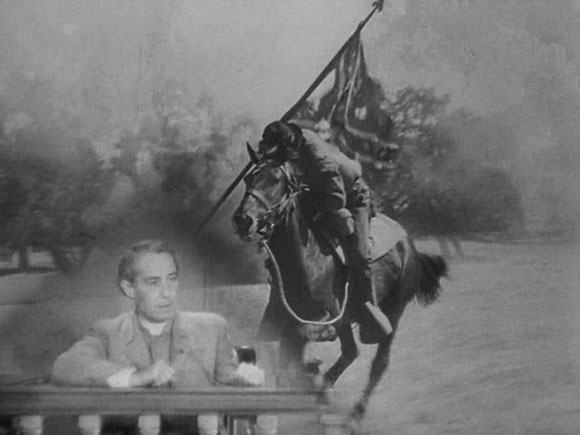
Humorist cowboy and populist philosopher Will Rogers plays the titular good-ol’-boy judge, and controversial sleepy-eyed black actor Stepin Fetchit is his sidekick. Priest is a former confederate soldier (“I kinda calmed down”) who is endlessly proud of Dixie, but respects the law and modern reality, or seems resigned to them anyway.
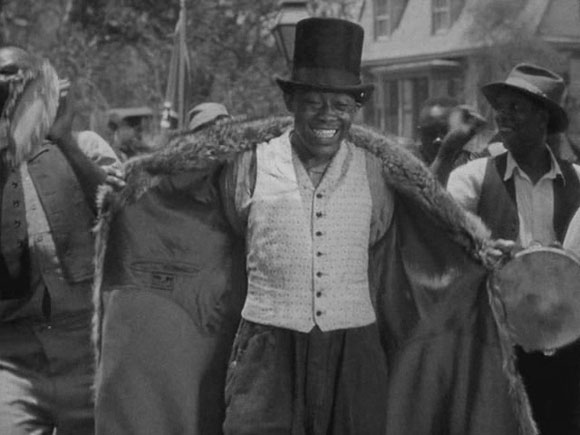
The judge’s nephew Jerome (Tom Brown) comes back to town and you can tell he’s supposed to end up with the neighbor girl Ellie May (Anita Louise) but he keeps ending up on dates with a dark-haired temptress instead (Rochelle Hudson, who voiced MGM cartoons and later appeared in Strait-Jacket and Dr. Terror’s Gallery of Horrors). Of course they do end up together after wasting plenty of screen time we’d rather be spending with Will Rogers, but first there’s some problem about Ellie May not having a father.
Our generic romantic leads… everything else in the film is more interesting than these two:

Trouble starts in town when the mysterious new guy in town, a blacksmith (the Walter Matthau-looking David Landau of Horse Feathers) punches out Flem the barber for making a crack about Ellie May. He is to be tried in court before Judge Priest, but meddling, villainous-looking senator Horace Maydew points out that Priest was present at the incident and took the blacksmith’s side, so Priest agrees to step down and let someone else (Henry Walthall, in the movies since 1908, costarred in Birth of a Nation and London After Midnight) preside. Priest stays involved by offering to defend the blacksmith, finally, triumphantly revealing him to be an ex-con, a confederate war hero, AND Ellie May’s father.

I found less stirring emotion in the overlong “dixie”-soundtracked heartfelt courtroom ending than in a scene early on with the judge talking to a photo of his dead wife. He’s supposed to be a lonely man, but with the young lovers and the big trial, and with Priest’s jovial nature, Ford doesn’t dwell on that aspect too much… just gives us that one lovely scene providing Priest with a deep enough soul to last the rest of the film.

Otherwise things stay pretty light, and there’s plenty of worthwhile diversions like the outrageous performance of Stepin Fetchit, and Hattie McDaniel (as Priest’s maid) singing “the sun shines bright in my old kentucky home.”
Look far-left for Hattie:
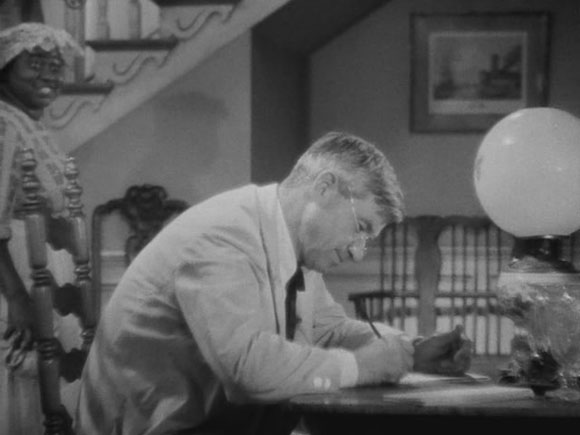
Screenplay written by Atlantan Lamar Trotti (American Guerrilla in the Philippines) and Dudley Nichols (Man Hunt, Scarlet Street). Based on a series of books by Irvin Cobb, author of McTeague (Greed), who hosted the Oscars the following year (1935 – this wasn’t nominated). Will Rogers had hosted in ’33. Time was unkind to the lead actors… Rogers, Walthall, and Landau all died within two years of the film’s release.
Sneering villain Horace Maydew:

–
THE SUN SHINES BRIGHT (1953)
I’d thought this would be a remake of Judge Priest, but not exactly. Sure, at the beginning a young man comes home and starts romancing a young girl with a conspicuously missing parent, and sure Judge Priest (now played by Charles Winninger, the captain in Show Boat) is our central character and Stepin Fetchit (the same actor!) is his slow, slurred-voiced sidekick/servant, but things take a turn from there.

Priest is still a likable soul, but now he’s an alcoholic on the verge of losing his seat to slick Horace Maydew. Priest doesn’t seem like he runs this hick town anymore – he’s an increasingly irrelevant member of a rapidly growing city. He’s a wise and engaging character, but he’s no Will Rogers. And while the first movie showed us the judge’s loneliness at the start then cheered us up for the next hour, this one gives the judge a rocky start (waking up and yelling for his negro servant to bring him whiskey!), builds him up more and more, then fires off a devastating visual ending, the judge silently retreating into his house alone.
Horace Maydew isn’t as cartoonish a bad guy in this movie:
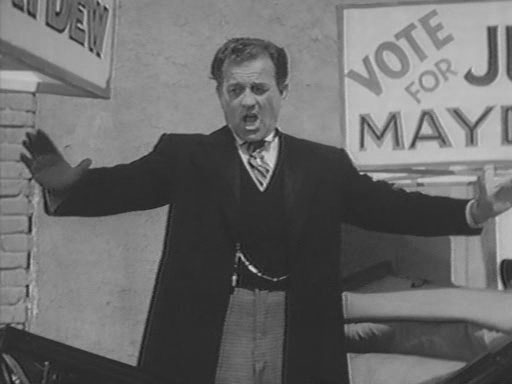
The twist this time: young Lucy Lee’s mom, a prostitute who left town so her daughter wouldn’t grow up in shame, returns home to die. Lucy Lee finds out about this, and about her grandfather, the solitary wealthy General Fairfield (James Kirkwood, a director in the silent era, and the farmer in A Corner In Wheat), a former confederate who has distanced himself from his past and won’t talk before the veterans group which Priest leads each week.
The judge and the general share a tender moment:

Before LL’s mom died she asked brothel madam Mallie Cramp (Eve March: the little girl’s teacher in Curse of the Cat People, Hepburn’s secretary in Adam’s Rib) to give her a proper funeral and burial and strong-willed Mallie would like to, but she’s met with resistance by the townsfolk, who of course support the brothel but bristle at the idea of those women having public lives or even deaths.

The rest of the plot is more complex than in Judge Priest. No big climactic court case, but a few overlapping issues. First, Priest is up for re-election and it’s a close race with Maydew (Milburn Stone, a detective in Pickup On South Street the same year), who paints Priest as old-fashioned and out-of-touch. Young lover Ashby (stiff, cliff-faced John Russell, the main bad dude in Rio Bravo) wins a whip-fight (!) with slimy rabble-rouser Buck Ramsey (Grant Withers, who killed himself a few years later) over Lucy Lee (Arleen Whelan of Young Mr. Lincoln), and Ramsey returns leading an angry mob hoping to lynch young black harmonica player U.S. Grant Woodford suspected of raping a girl out of town. Priest is already politicking around town, leading his confederate group, and dealing with the Lucy Lee situation when he decides to risk his life by blocking the lynch mob and risk his reputation by being the first to follow the prostitute funeral procession through the streets. Priest closes those matters out (U.S. Grant is proven innocent and released, actual rapist Buck is shot trying to escape, Lucy Lee reconnects with her grandfather) just in time to cast the decisive vote re-electing himself. In the end he’s a hero of the town, and everyone stops by his house to wave and sing praises… but he still goes home alone.

There were 30+ John Ford films between Judge Priest and this (including Rio Grande and The Quiet Man) and he had nearly 20 more left in him. This one, unlike the original, can definitely not be called a comedy. It has some comic relief though, in the form of drunken hick sharpshooter duo Francis Ford (his 32nd and final appearance in one of his brother’s films) and Slim Pickens (a decade before Dr. Strangelove and Major Dundee). I wanted to like the 30’s movie more, with its lighter tone and a Judge Priest character who is affable without having to humbly heal the whole town’s social wounds while saving a boy’s life, but I think the latter movie impressed me more deeply. No doubt they’re both excellent and make for a lovely double feature though.

Jonathan Rosenbaum:
Today The Sun Shines Bright is my favourite Ford film, and I suspect that part of what makes me love it as much as I do is that it’s the opposite of Gone with the Wind in almost every way, especially in relation to the power associated with stars and money. Although I’m also extremely fond of Judge Priest, a 1934 Ford film derived from some of the same Irvin S. Cobb stories, the fact that it has a big-time Hollywood star of the period, Will Rogers, is probably the greatest single difference, and even though I love both Rogers and his performance in Judge Priest, I love The Sun Shines Bright even more because of the greater intimacy and modesty of its own scale.
I should add that in between Judge Priest’s stopping of a lynching and his triumphant re-election brought about in part by the potential lynchers is the act that the Ford regards as his key act of moral and civil virtue – arguably far more important in certain ways, at least in this film’s terms, than his prevention of the lynching. I’m speaking, of course, of his joining a funeral procession for a fallen woman on election day, thereby fulfilling her dying request that she be given a proper burial in her own home town. Once Billy Priest joins this procession, he is followed by almost every other sympathetic member of the community, starting with the local bordello madam and her fellow prostitutes, and continuing with the commander of the Union veterans of the Civil War, the local blacksmith, the German-American who owns the department store, Amora Ratchitt (Jane Darwell), Lucy Lee, Ashby, Dr. Lake, and finally – after the procession arrives at its destination, a black church – General Fairfield, Lucy’s grandfather, who has up until now refused to recognised his daughter under any circumstances.
There are actually two protracted and highly ceremonial processions in the film, occurring quite close to one another – the funeral procession for Lucy Lee’s mother and the parade of tribute to Judge Priest – and the fact that these two remarkable sequences are allowed by Ford to take over the film as a whole is part of what’s so extraordinary about them. Retroactively one might even say that they almost blend together in our memory as a single procession – despite the fact that the first is an act of mourning and the second is an act of celebration – and this undoubtedly contributes to the feeling of pathos in the film in spite of its overdetermined happy ending.
Ultimately, what the film may be expressing is neither celebration nor lament, perhaps just simply affection for cantankerous individuals who exude a certain sweet pathos because history has somehow passed them by – as someone says in the film, I believe in reference to the Confederate veterans, ‘the doddering relics of a lost cause’, which also suggests The Southerner as Everyman. This implicitly suggests a certain darkness as well as lightness – which is why the local blacks serenade the judge with ‘My Old Kentucky Home,’ the first line of which is, ‘The Sun Shines Bright’ – and yet this is a film bathed mainly in the melancholy of twilight. For to emphasise and focus on lost causes as opposed to causes that still might be won assumes a certain abstention from politics associated with defeatism – one reason among others, perhaps, why the Civil War plays such a central role in American history as well as in Ford’s work.
Someone can tell me if I’m out of line in quoting too heavily from this, but it’s so nice to see long, well-thought article devoted to an obscure classic film. If only EVERY film had as thorough a write-up on these internets. Maybe some day.
Our generic romantic leads. Once again, everything in the film is more interesting than these two, but this time Ford seems to realize it.

Merian C. Cooper’s name is on the title card – first time I’ve seen him mentioned in a non-King Kong context. I guess he exec-produced a bunch of John Ford movies. Shot by Archie Stout, who won an oscar the previous year for Ford’s The Quiet Man.
The Searchers (1956, John Ford)
So I’ve finally watched The Searchers. For a couple years I’d heard that it was one of The Greatest Films so wanted to see it badly, but then I changed my mind and decided I probably wouldn’t like it because of John Wayne, then I stewed on that for a few years until finally it sat as maybe the movie I’d been meaning to see longer than any other.
All those expectations, and I end up liking it. Worst of all, I thought John Wayne was good, damn it all.
IMDB plot summary: “Ethan Edwards, returned from the Civil War to the Texas ranch of his brother, hopes to find a home with his family and to be near the woman he obviously but secretly loves. But a Comanche raid destroys these plans, and Ethan sets out, along with his 1/8 Indian nephew Martin, on a years-long journey to find the niece kidnapped by the Indians under Chief Scar. But as the quest goes on, Martin begins to realize that his uncle’s hatred for the Indians is beginning to spill over onto his now-assimilated niece. Martin becomes uncertain whether Ethan plans to rescue Debbie…or kill her.”
Jeffrey Hunter (Jesus in King of Kings) is Wayne’s sidekick nephew and Vera Miles (psycho, the wrong man) is the nephew’s love interest. Natalie Wood and her young sister Lana play the kidnapped Debbie. John Wayne’s iconic performance in The Searchers came the same year as one of his most hated roles ever, as Genghis Khan in The Conqueror.
Very meaningful opening shot:

Horses are neat:
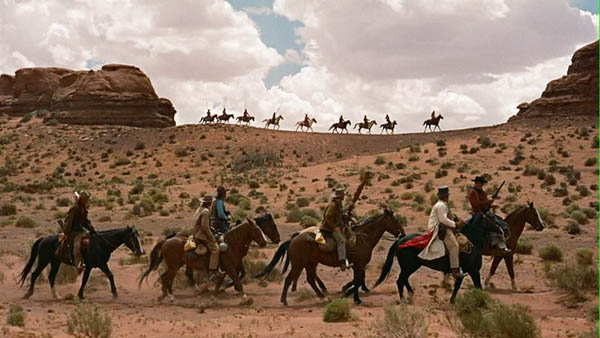
Hunter tries to temper Wayne’s anti-Indian rage:
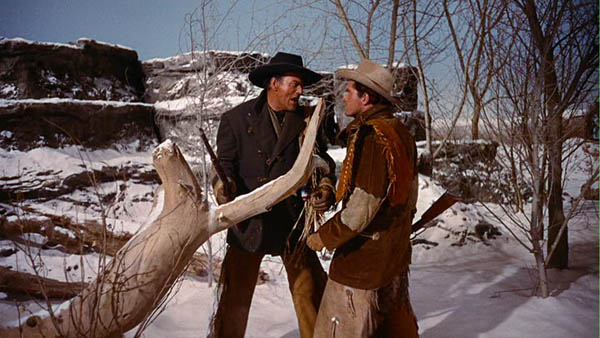
Indians are neat:
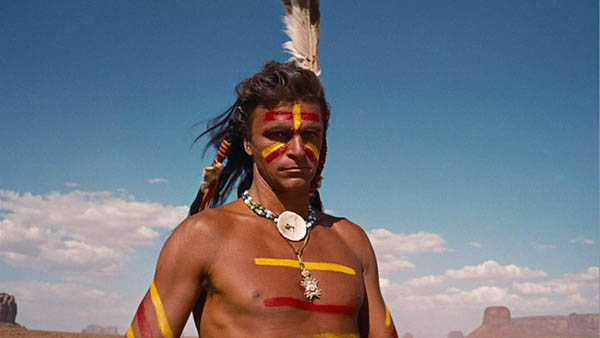
Very meaningful closing shot:
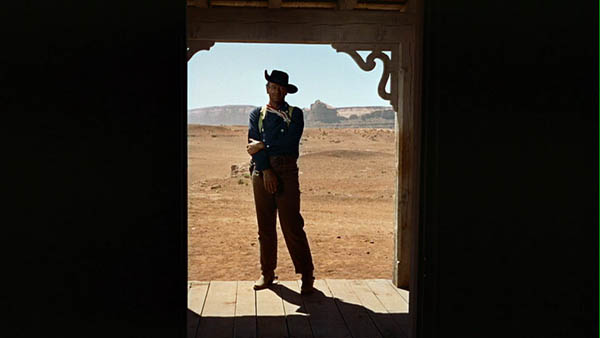
So what’s the new “movie I’ve been planning to see longer than any other”?
Sunset Blvd? Weekend? Nashville? Something I started and never finished like Crumb or Night On Earth? DVDs I bought ages ago like Benjamin Smoke and Henry V? I’m gonna go with Hitchcock’s The Lady Vanishes.